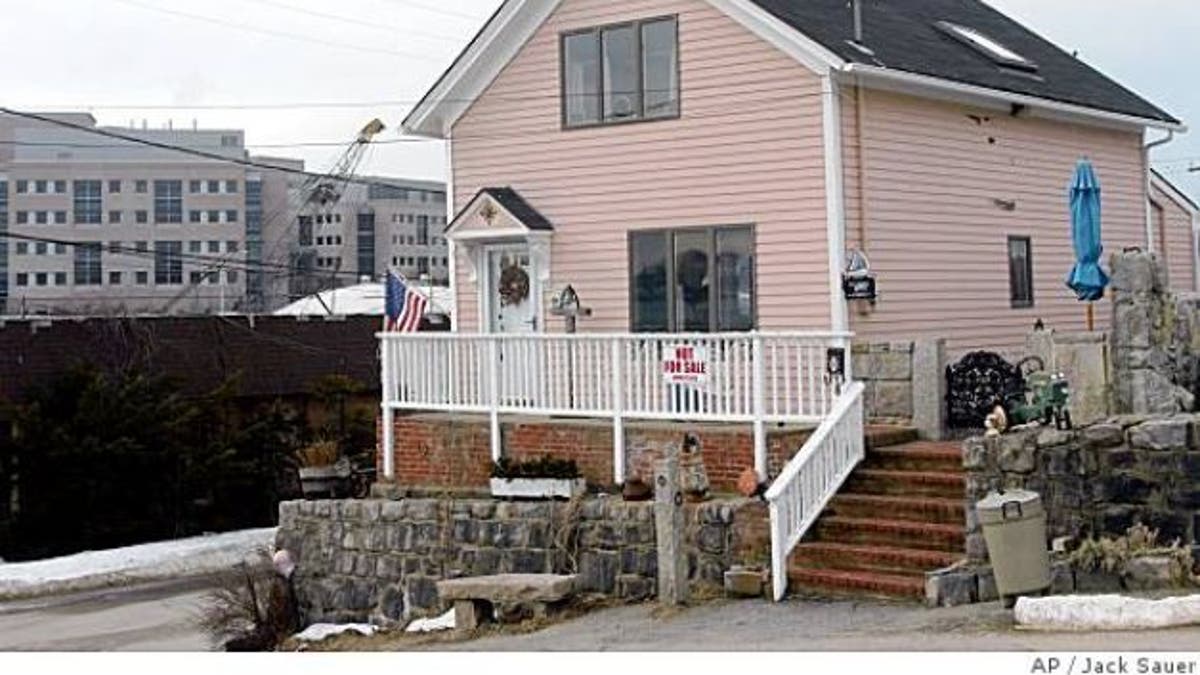
Feb. 8, 2005: The home of Susette Kelo in the Fort Trumbull section of New London, Conn. The small house once at the center of a U.S. Supreme Court decision on government seizure of private property was later disassembled and relocated to a site close to downtown New London. Avner Gregory, of New London, the new owner, dedicated his house on June 21, 2008, before a crowd of about 200 participants and onlookers. (AP/Jack Sauer)
The controversial Supreme Court ruling that expanded eminent domain to give government the right to take private property to allow economic development may have been all for nothing, according to a report.
Nine years after the high court sided with a Connecticut municipality in Kelo v. City of New London, a ruling Associate Justice Antonin Scalia has likened to the court's disastrous Dred Scott decision, the 90-acre plot once earmarked for office buildings, luxury apartments and a new marina, remains vacant.
Seven residents who fought all the way to the Supreme Court to keep their working-class homes in the city's Fort Trumbull section have only their memories and whatever remains of the money they were forced to accept.
“See that pole with the transformer hanging from it?” Michael Cristofaro, a 52-year-old computer network engineer, told The Weekly Standard, which recently visited the town. “That was where my family’s home was.”
In the landmark 5-4 ruling, named for the lead plaintiff, a nurse named Susette Kelo, the Supreme Court upheld a state Supreme Court ruling that the city of 27,000 and a nonprofit entity called the New London Development Corp. were entitled to seize those properties in the name of economic development. Previously, eminent domain had been seen as limited to cases involving projects deemed as benefiting the public, but not a private economic interest.
“The nationwide outrage that followed in the wake of the Kelo decision spanned from left to right and back again on the political spectrum,” The Weekly Standard noted. “It didn’t help that one of the chief beneficiaries of the NLDC’s economic development plan would have been the pharmaceutical giant Pfizer, Inc., which New London had lured into the city via an 80-percent, 10-year property-tax abatement for a $300 million research facility -- an expansion of the company’s research operations in Groton, Conn., across the Thames.”
More than 40 state legislatures would later pass laws banning or restricting the use of eminent domain for economic rejuvenation, particularly if homeowners would be displaced. And at least seven states amended their constitutions to ban the use of eminent domain for economic development, with some state courts explicitly rejecting the Kelo ruling as precedent, The Weekly Standard reports.
So how does New London, specifically Fort Trumbull, look now?
“The homeowners were dispossessed for nothing,” wrote The Boston Globe’s Jeff Jacoby. “Fort Trumbull was never redeveloped. Pfizer itself bailed out of New London in 2009. The Kelo decision was a disaster, as even the city’s present political leaders acknowledge.”
Associate Justices John Paul Stevens, Stephen Breyer, David Souter, Ruth Bader Ginsburg and Anthony Kennedy formed the narrow majority in the landmark Supreme Court decision, with its conservative bloc dissenting.
“Today, the Court abandons [the Fifth Amendment’s] long-held, basic limitation on government power," now-retired Justice Sandra Day O’Connor wrote in her dissenting opinion. “Under the banner of economic development, all private property is now vulnerable to being taken and transferred to another private owner, so long as it might be upgraded, i.e. given to an owner who will use it in a way that the legislature deems more beneficial to the public — in the process.”
The story of New London is akin to a Greek tragedy, according to The Weekly Standard, or perhaps “Eminent disaster,” as the Globe’s opinion headline reads.
“The founders put the takings clause in the Bill of Rights for a reason,” Jacoby wrote. “The desolation that is Fort Trumbull is a grim reminder that where property rights aren’t secure, neither is freedom — and without freedom, there is nothing the government can’t destroy.”




